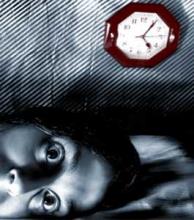Life tip #271: remember to sleep. Sleep's good for you, kids. If you don't sleep, you're going to die.
After about a year, that is. That's how long a human can stay awake before permanently shutting down. For what it's worth, most people don't make it that long without conking out for at least a little while. The body needs sleep to complete essential cell processes and the brain needs it to keep you from going completely off the rails. While sleep's purpose and functions are still in many ways mysterious to us, it's proven to be an indispensable biological function. And like food or water, people die without it.
Most insomniacs suffer an increased difficulty in falling asleep. Most clock only a few hours of unconsciousness per night, and some experience whole nights completely awake. It's rare for an individual to go multiple nights without any sleep at all, though; even if you're under extreme stress, the body tends to knock itself out for a bit if just to stay alive. While chronic insomniacs can experience unpleasant symptoms like hallucinations, blurring, and double vision, they rarely die from their condition. Their brains allow them at least the bare minimum of sleep needed for survival.
Then there are those who find themselves actually, biologically incapable of sleep. They have a special and very rare type of sleep disorder known as fatal familial insomnia. It's a hereditary condition usually caused by a genetic mutation that leads to a specific protein being built incorrectly. FFI has only ever affected about 100 people throughout the world, but each and every one of them has died from it.
People born with the disorder won't even know it until they reach middle age. The average age of onset is 50, but people can experience symptoms as early as 35 or as late as 60. It begins like any other case of insomnia: you start to have trouble falling asleep or staying asleep, you experience extreme tiredness during the day, your levels of anxiety rise. Maybe you confuse cause and symptom, figuring your newly acquired insomnia has resulted from increased levels of stress at work or at home. You pop some Valerian root and try to get on with your life. It doesn't work. You start getting panic attacks. You develop phobias you've never had before. Maybe you go to a psychiatrist, maybe they send you home with meds. They don't work. Nothing works. You've suddenly, without warning, lost your ability to sleep well.
That's only stage one of the disorder. It tends to last for about four months before progressing into stage two, wherein your panic attacks become more extreme and you begin experiencing hallucinations. You're probably a nonfunctional mess at this point. Maybe the doctors have figured out what's going on, maybe not. They might try prescribing sleeping pills, not knowing that sedatives and barbiturates only accelerate the condition. After five months of panicked trips, you completely, irreversibly lose your ability to sleep. Not one minute is spent in unconsciousness. You experience rapid weight loss. You might enter an early menopause if you're a woman. After three months of no sleep whatsoever, you enter a state of catatonic dementia and ultimately die.
There's no known cure or treatment for the condition. Scientists have no idea how to reverse it. If you've got it, you're going to have to spend up to 18 months in a state of sleepless psychological torture before finally going insane and checking out. The good news is that you probably don't have FFI. The bad news is that if you did, you wouldn't even know until it spontaneously appeared in middle age. Sleep tight!
